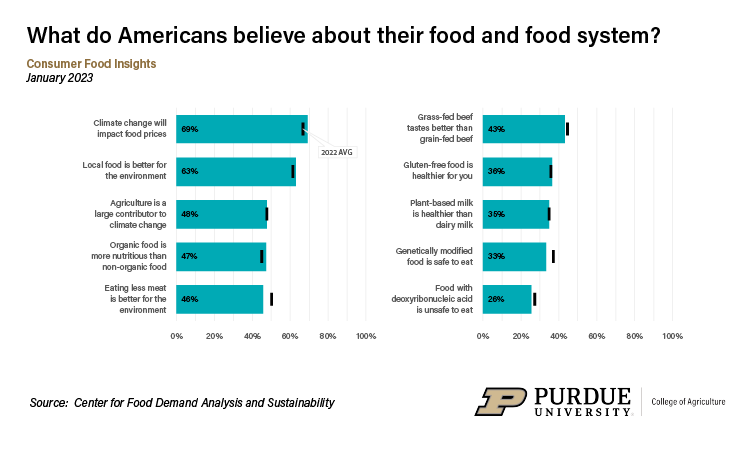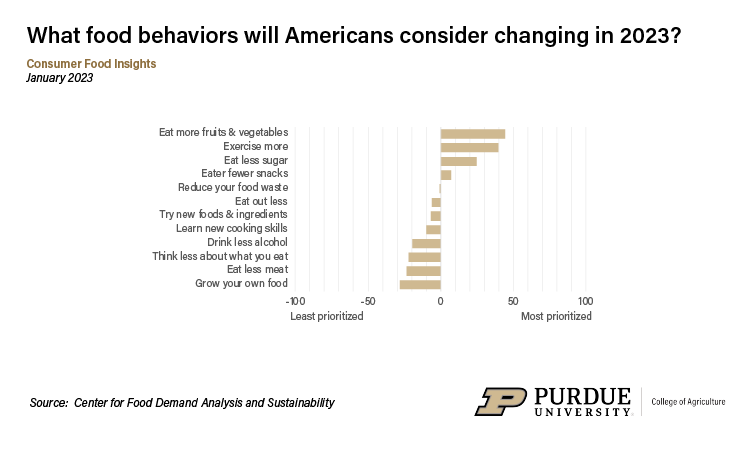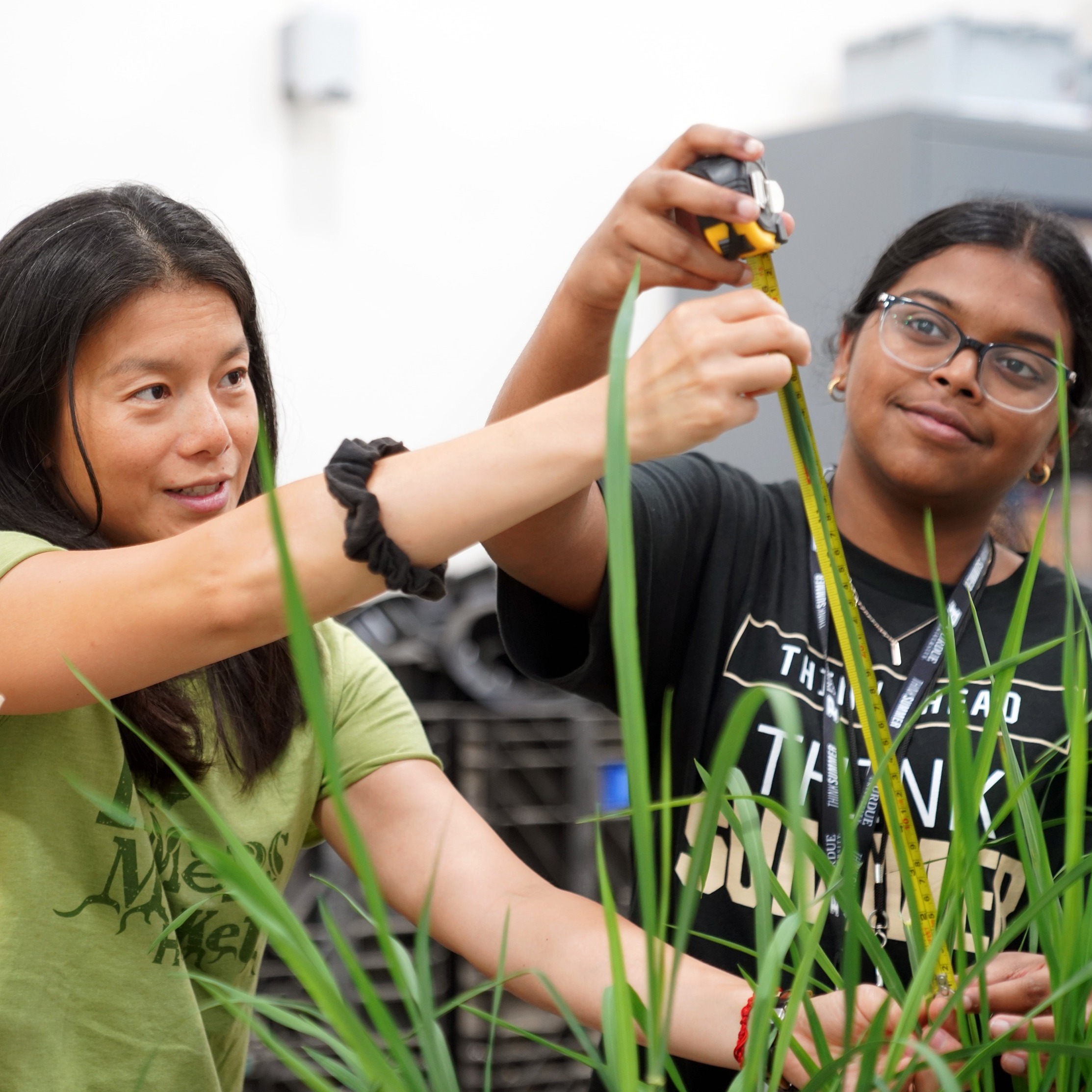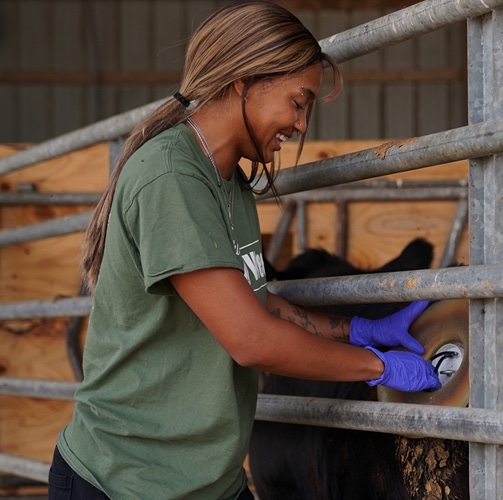Eating more fruits and vegetables and less sugar ranked highly as potential changes to eating behaviors related to New Year’s resolutions, according to the January Consumer Food Insights Report. This month’s report also summarizes and discusses the state of the survey indicators after one full year of data collection.
The survey-based report out of Purdue University’s Center for Food Demand Analysis and Sustainability assesses food spending, consumer satisfaction and values, support of agricultural and food policies and trust in information sources. Purdue experts conducted and evaluated the survey, which included 1,200 consumers across the U.S.
"People are generally knowledgeable about the actions needed to improve health and want to pursue them — such as increasing fruits and vegetables and exercising more,” said Jayson Lusk, the head and Distinguished Professor of Agricultural Economics at Purdue, who leads the center. “However, they don’t necessarily want to give up on taste and indulgences. For example, eating less meat or drinking less alcohol is low on the list of priorities of most Americans.”
As the Consumer Food Insights Report has noted previously, food spending is up significantly — 19% — from a year ago. Grocery spending, however, has remained effectively flat for the past six months.
“It appears that people have already cut back and found deals to help stop their food spending from continually rising,” Lusk said. “If food inflation does not come down significantly this year, consumers might not have much room to maneuver their budgets further.”
Those surveyed estimated that current inflation is up more than 1 percentage point from last month. But the survey results show that people seem to remain optimistic about inflation declining dramatically over the next year.
Additional key results include:
- Food insecurity is unchanged from January 2022, but a decline in households visiting food pantries raises further questions.
- Americans report being neither risk averse nor risk loving but are slightly more cautious with regards to their health.
- Trust in the USDA and US Department of Health and Human Services’ Dietary Guidelines for Americans is at an all-time high as its advisory committee prepares to discuss 2025 guidelines.
- A large majority of people want to increase funding and technical support to agricultural producers.
Despite price increases, the rate of national food insecurity again shows surprising consistency from last January, said Sam Polzin, a food and agriculture survey scientist for the center and co-author of the report.
“In fact, we have even seen a continued decline in the share of households who say they have received free food from a pantry this month,” Polzin said. “Given the current high-price environment, it is hard to believe that fewer people need help from the charitable food system. We might ask if there are fewer charitable food resources available now or if people are having a harder time accessing them.”
Overall, the sustainable food purchasing index continues to show consistency. But as the “taste” and “economic” aspects of the index remain strong, the ongoing weakness of the environment and social indicators is discouraging from the sustainability perspective, Polzin noted.
Behaviors like “choosing plant-based proteins over animal proteins” are rare. Similarly, beliefs like “agriculture is a significant contributor to climate change” are held by a minority.
 Share of Consumers who 'Somewhat Agree' or 'Strongly Agree' with Claims about Food and Nutrition, January '23
Share of Consumers who 'Somewhat Agree' or 'Strongly Agree' with Claims about Food and Nutrition, January '23 “We might say that food system sustainability does not concern consumers as much as some advocates might want it. We saw little change on this front in our survey over the course of 2022,” Polzin said.
As for risk-taking, Americans generally consider themselves to be middle-of-the road in daily life, scoring 5.4 on a 0 to 10 (risk averse to risk loving) scale. They rated their risk tolerance regarding their health generally about one point lower, 4.3. But when it comes to food consumption, their risk tolerance is 5.2 for “food consumed at home,” and 5.1 for “away from home.”
Lusk further discusses the report in his blog.
The Center for Food Demand Analysis and Sustainability is part of Purdue’s Next Moves in agriculture and food systems and uses innovative data analysis shared through user-friendly platforms to improve the food system. In addition to the Consumer Food Insights Report, the center offers a portfolio of online dashboards.






